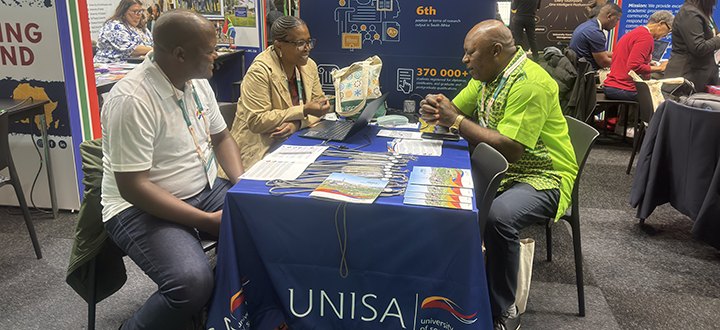News & Events
Unisa participates in the prestigious EAIE Conference

The European Association for International Education (EAIE) 2025 Conference and Exhibition
Unisa recently participated in the notable European Association for International Education (EAIE) Conference and Exhibition – one of the largest international higher education events, which called on delegates to embrace collaborative creativity across borders, institutions, and various sectors to identify opportunities and address pressing challenges facing higher education globally.
The event took place from 9 to 12 September 2025, at Gothenburg in Sweden, under the theme “Go-create”, attracting over 7000 international higher education professionals from more than 100 countries. The conference featured a series of plenary sessions, thematic workshops and panel discussions that examined collaboration in areas such as inclusive student engagement, higher education policy development, collaborative research partnerships, inclusive internationalisation, climate action, and innovation in mobility and digital education.
IEASA membership – Study SA Exhibition
Positioned as one of the key attractions of the EAIE Conference, the Study SA Exhibition booth provided the participating South African universities an informal, yet ideal setting for delegates to connect with peers, institutional representatives, and international higher education service providers, enriching their conference experience and expanding their global networks.

Study SA exhibition booths
Unisa had the opportunity to exhibit at the EAIE event through its active membership of the International Education Association of South Africa (IEASA). As a member, Unisa and other members benefit from IEASA’s facilitation of South African universities' representation at key international events. In addition to the EAIE Conference, the university also participates in events led by the Africa Network for Internationalization of Education, the Association of African Universities, the Southern African Regional Universities Association, and the National Association of Foreign Student Affairs (also known as the Association of International Educators), among others.
The IEASA membership provides a valuable platform for members to engage in critical discussions and exhibitions focused on emerging trends, policy developments, and partnership building in the field of internationalisation.
During the week-long conference and exhibition, Unisa delegates held intentional and strategic engagements with both new and established partners, fostering new collaborations while strengthening existing ones. These interactions were strategically focused on advancing partnerships that support Unisa’s 10 catalytic niche areas, and on identifying and securing valuable mobility opportunities for Unisa students to enhance their international learning experiences. This proactive involvement demonstrates Unisa’s dedication towards cultivating meaningful and enduring international partnerships that advance both its academic mission and student mobility objectives.

Internationalinalisation and partnerships (IP) office staff engaging with colleagues from various international universities
Subsequent to collaboration discussions with multiple European, Canadian, African and Asian universities, it was evident that the Erasmus+ and tailored student and staff mobility programmes would be prioritised for implementation in early 2026. Partner institutions, including the University of Bristol, which already has a signed memorandum of understanding with Unisa, have agreed to establish mutual funding arrangements to support these mobility initiatives.
Engagement with Unisa alumni
International conferences such as the EAIE also serve as platforms for universities to showcase their achievements, elevate institutional visibility, and cultivate relationships with prospective students, alumni and donors. One of the highlights from the conference was engaging with several proud Unisa alumni that visited the Study SA Exhibition stand. Among them was Professor Elvis Tarkang, who specialises in health promotion and is a proud Unisa alumnus. Tarkang graduated with his PhD from Unisa in 2010, with his thesis focusing on the social and behavioural aspects of human immunodeficiency virus (HIV), under the supervision of the late Professor D.M. van der Wal and Professor Valerie Ehlers of Unisa’s Department of Health Studies under the College of Human Sciences (CHS).
Tarkang is the Dean of International Programmess at the University of Health and Allied Sciences in Ghana. He expressed interest in initiating a collaboration with Unisa’s CHS to advance the Health/Pharmaceutical Studies catalytic niche area, with specific focus on indigenous and alternative medicines.

Unisa alumni Prof Prof Elvis Tarkang engaging which Dr Angie Magabane and Godfrey Mahloko form the IP office
This collaboration would leverage Tarkang’s internationally recognised profile and his active engagement in the continent and global health promotion networks. It would also elevate the impact of teaching, research, and engaged scholarship in the college.
* By Dr Angie Magabane, Director of Internationalisation and Partnerships, Department of Institutional Advancement
Publish date: 2025/09/18
